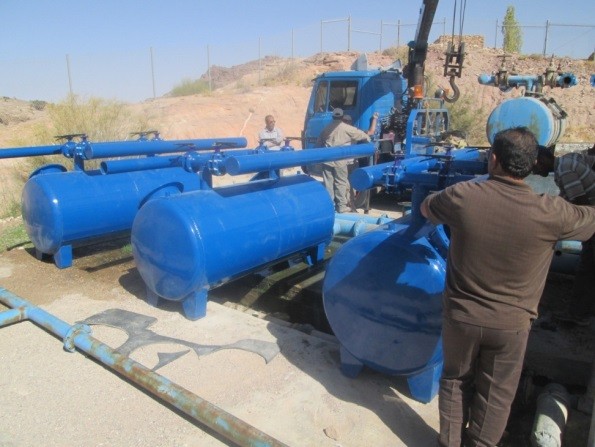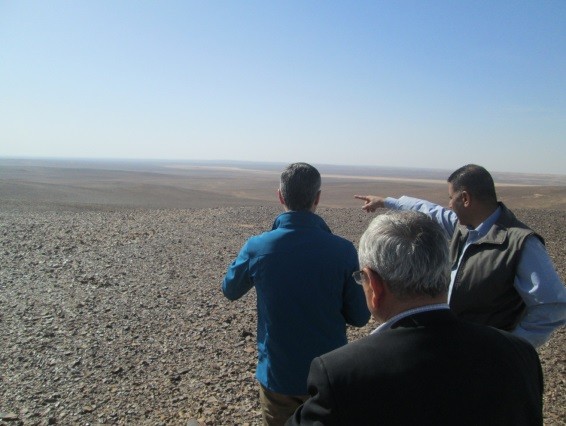Background

Jordan’s water shortage is a complex and persistent issue that requires innovative and sustainable solutions from numerous agencies and organizations. The water challenge can by no means be solved overnight – it requires a big-picture long-term approach.
The Water Reuse and Environmental Conservation Project (WRECP) works with communities and partner organizations to find comprehensive solutions to these wide-ranging challenges. Major undertakings to date have included wastewater treatment plants, agricultural training programs, and water sector regulatory reform. The project has also designed landfill rehabilitation plans and has worked with industrial facilities to reduce pollution while saving money in the process.
To build cross-ministry cooperation for cleanup efforts at the Ekeder and Russeifah dump sites, WRECP set up a network portal for industrial facilities, academics, and others to share their knowledge and experience, gaining praise from Prime Minister Abdullah Ensour. Perhaps most importantly, the project is improving dialogue among key parties, helping to form partnerships, and working on shared issues.
Project overview
USAID and the Government of Jordan (GoJ) are working together to protect and conserve scarce resources through WRECP. The project supports the preservation of the environment, training on pollution prevention and environmental management, rehabilitation for landfills and polluted “hot spots,” and the reuse of water and biosolids to support community livelihoods. Main goals include:
- Increasing the efficient use of water and energy by Jordanian industries through training and technical support.
- Supporting industrial efforts to improve environmental performance.
- Improving the Ministry of Environment’s (MoEnv) capacity to enforce environmental regulations.
- Strengthening the ability of laboratories to analyze industrial wastewater samples.
- Cleaning up polluted “hot spots,” improving industrial waste management practices, and strengthening industrial wastewater treatment.
- Helping communities generate income through water reuse projects.
- Increasing public awareness of the benefits of water reuse and promoting the sustainable reuse of biosolids.
Project beneficiaries include the industrial sector, farmers, targeted government ministries, and the general public. Primary partners include the Aqaba Special Economic Zone, King Abdullah II Center for Excellence, Jordan Investment Board, Jordan Chamber of Industry, Ministry of Agriculture, Ministry of Municipal Affairs, Ministry of Environment, Ministry of Industry and Trade, Ministry of Water and Irrigation, and the Royal Scientific Society.
Activities and Impact
Regulatory Strengthening
- Assisted MoEnv in institutional development, environmental policy, laws and regulations, environmental assessment/licensing, waste management, and inspection/compliance. Impact: Improved enforcement, institutional transparency, and established a new environmental protection law.
- Established www.jordannetwork.net to promote environmental compliance through education and information sharing. Registered 1,865 users, uploaded 1,326 resources, and held 53 events before transferring the site to the Royal Scientific Society. Impact: Improved environmental performance through the use of a shared database.
- Helped three national laboratories qualify for accreditation in wastewater testing. Impact: Made wastewater testing in Jordan more affordable.
- Designed the framework for the National Environmental Performance Award. Impact: Increased incentives for responsible industrial environmental performance.

Pollution Prevention and Industrial Waste Management
- Trained staff from 100 industrial facilities on environmental management systems (EMS) and pollution prevention (P2). Also partnered with 30 facilities to develop EMS and P2 plans. Impact: Pollution control and water/energy saving measures have been implemented in select factories throughout Jordan.
- Prepared designs and tendered documents for the Zarqa Industrial Wastewater Treatment Plant (WWTP) and for the upgrade of the WWTP at Abdullah II Ibn Hussein Industrial Estate. Impact: Industrial facilities have wastewater treatment options that comply with discharge standards and provide economic benefits from reuse.
- Prepared the Aqaba Water Reuse Master Plan, Integrated Water Resources Management Plan, and Strategic Environmental Management Plan for the Abdullah II Ibn Hussein Industrial Estate. Impact: Provided tools and models for managing environmental issues.
Disposal Site Rehabilitation
- Developed a master plan for developing the Ekeder dump site (Mafraq), and planned site cleanup, recycling facilities, and new treatment and disposal facilities. Impact: Will reduce pollution, protect public health and the environment, and improve economic opportunity through recycling.
- Designed cleanup plans for the landfill, lagoon, mining pit and abandoned tunnels in Russeifeh (Zarqa Governorate). Impact: Projected to clean up a hazardous pollution “hot spot,” protecting public health and the environment.
- Designed a new landfill cell in Aqaba and explored recycling options. Impact: Will expand environmentally safe practices and the landfill’s usable lifetime.
Water Reuse
- At the Wadi Mousa pilot project, trained farmers and the water users’ association in irrigation system repair, marketing, and best practices. Impact: Improved crop yield, established seed farms, and increased incomes.
- Worked with farmers at Al-Lajjoun (Karak Governorate), Al-Zaatari and Azraq to replicate the Wadi Mousa pilot project’s success. Impact: Standardized options for reuse that can be replicated easily.
Biosolids Management
- Supported the GoJ in revising regulations for biosolids use in certain forms of agriculture. Impact: Will increase fodder crop yields, restore Jordan’s Badia and rangelands, reduce pollution, and benefit communities economically.
- At the As-Samra WWTP (Zarqa Governorate), prepared the design and tendered documents for a new landfill to dispose of biosolids.Impact: Projected to allow the safe disposal of biosolids at As-Samra.







Comment
Make a general inquiry or suggest an improvement.